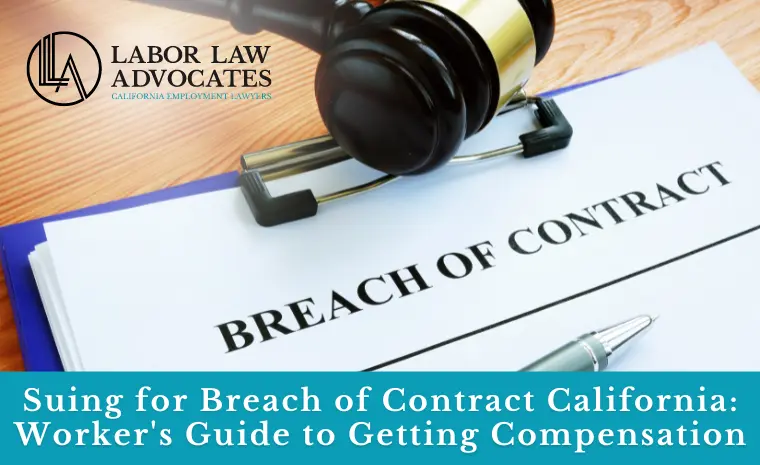Suing for Breach of Contract California: Worker’s Guide to Getting Compensation
Contracts between employees and employers are standard agreements that outline employee benefits, duties, employer expectations, wages, and other job details. In California, it is customary for companies to require employees to sign a valid contract. This document serves as legal proof of the job relationship and must be adhered to with integrity and responsibility.
Facing a breach of contract can be haunting, but with the right information and approach, you can protect your interests and seek a just resolution. If your employer has broken the law or engaged in illegal practices that violate your contract, you have the option to seek justice and pursue financial compensation. Take action to protect your legal rights and hold those responsible for their negligence accountable.
Labor Law Advocates are here to help.
Breach Of Contract
A breach of contract occurs when one party fails to fulfill its obligations as outlined in the contract. This can include not paying the agreed-upon salary, not providing the promised benefits, or terminating employment without proper cause or notice.
Breaching an employment contract can have serious consequences for both parties involved. The party that breaches the contract may be held liable for damages, while the non-breaching party may experience financial loss or other negative impacts.
Types of Employment Contracts
In California, employment contracts are legal agreements that outline terms and conditions, such as job responsibilities, benefits, working hours, termination conditions, non-compete disclosure agreements, and other relevant terms.
By having a well-drafted employment contract, both signing parties are protected and have a clear understanding of their rights and obligations. It helps to prevent misunderstandings and disputes that may arise during the course of employment.
Written Contracts
This type of contract is a documented agreement that clearly outlines the terms and conditions of employment. It is considered the preferred method of formalizing an employment agreement. Contract in writing typically includes specific details such as:
- Names and addresses of both employer and employee.
- Job title and description of the employee’s responsibilities.
- Compensation details, including salary, bonuses, or commission structure.
- Working hours & schedule.
- Termination conditions.
- Benefits.
The content of the legal contract may vary according to the company’s policies.
Oral Contracts
Oral agreements are based on spoken communication instead of written documentation. Although oral contracts are legally enforceable in California, they can be difficult to prove in case of disputes or breaches, as no written evidence is available for reference.
Whether an employment contract is oral or written, it is necessary to comply with state and federal labor laws, moreover, the specifics of employment contracts can vary depending on the nature of the job, the industry, and the parties involved. For complex employment agreements or when dealing with illegal practices at work, it is advisable to seek legal counsel to ensure that the contract is fair, and your rights are being respected.
Fight against unlawful employers. File a claim for breach of contract.
Breach Of Contract: Legal VS Illegal
Can my employer break my contract? A breach of an employment contract can be legal or illegal, depending on the circumstances and the nature of the breach. Let’s explore both scenarios:
Legal Breach of Employment Contract
In some situations, a breach of an employment contract may be legally justified. This can occur when the breach is caused by one of the following:
a. Mutual Agreement: If both the employer and the employee agree, they can legally terminate or modify the contract based on mutual consent.
b. Constructive Dismissal: Constructive dismissal occurs when the employer creates a hostile work environment, fails to fulfill contractual obligations, or makes significant changes to the terms of employment without the employee’s consent. In such cases, the breach of contract may be justified if the employee chooses to leave the job.
c. Frustration of Contract: Frustration of contract happens when circumstances beyond either party’s control make it impossible to perform the contract. For example, if an employee becomes permanently unable to work due to a disability, the contract may be frustrated, and the employer may no longer be obligated to provide employment.
Illegal Breach of Employment Contract
An illegal breach of an employment contract occurs when one party fails to fulfill its contractual obligations without any lawful justification. This can happen in the following situations:
a. Unjustified Termination: If an employer terminates an employee without any valid reason specified in the employment contract or in violation of labor laws, it would be an illegal breach of the contract.
b. Non-Payment of Salary or Benefits: If an employer fails to pay an employee’s salary or provide agreed-upon benefits as per the contract, it would be an illegal breach.
c. Violation of Employment Terms: Any violation of the terms and conditions specified in the employment contract without proper legal justification would be considered an illegal breach.

Suing for Breach of Contract California
If you believe your employer in California has breached your employment contract, and you wish to take legal action, here are the typical steps you would follow:
Gather Evidence
Collect all relevant documents and evidence related to the employment contract and the alleged breach. This may include the employment contract itself, pay stubs, emails, performance evaluations, and any other documentation that supports your claim.
Consult with an Attorney
Seek the advice of an experienced employment attorney in California. An attorney can help you understand your rights, assess the strength of your case, and guide you through the legal process.
Attempt Mediation or Negotiation
Before resorting to litigation, consider attempting mediation or negotiation with the other party. Sometimes, disputes can be resolved more efficiently and cost-effectively through alternative dispute resolution methods.
File a Lawsuit
If mediation or negotiation fails to resolve the issue, your attorney can file a lawsuit on your behalf. The complaint will outline the details of the breach and the relief you are seeking. The lawsuit will typically be filed in the appropriate court with jurisdiction over the matter.
Serving the Complaint & the Defendant’s Response
After filing the lawsuit, the defendant (the party alleged to have breached the contract) must be formally served with the complaint and a summons, notifying them of the legal action.
Once served, the defendant will have a specific period of time (usually 30 days) to respond to the lawsuit by filing an answer. In some cases, the defendant may file a motion to dismiss the case.
Discovery
During the discovery phase, both parties exchange relevant information and evidence. This may involve written questions (interrogatories), document requests, and depositions.
Pre-trial Motions
Before the trial, there may be pre-trial motions where both parties seek rulings or clarifications from the court on certain legal or procedural matters.
Settlement Negotiations
Throughout the process, settlement negotiations may continue. It is common for parties to reach a resolution before going to trial.
Trial, Verdict & Judgment
If the case is not settled, it will proceed to trial. Both sides present their evidence, witnesses, and arguments to a judge or jury. After this process, the judge or jury will render a verdict.
If you win the case, the court will issue a judgment in your favor, specifying the relief you are entitled to receive.
Enforcement
If the defendant does not comply with the judgment voluntarily, you may need to take further legal steps to enforce the court’s decision, such as wage garnishment or other means of collecting the awarded damages.
Consequences of Breach of Employment Contract
If an illegal breach of an employment contract occurs, the aggrieved party may seek legal remedies, which can include:
- Compensation: Any financial losses incurred due to the breach. Such as loss of wages, vacation payment, extraordinary hours, leave benefits, and more.
- Reinstatement: In some cases, if the breach involved unjustified termination, the court may order the employer to reinstate the employee to their position.
- Specific Performance: Rarely, the court may order the employer to perform specific contractual obligations if monetary compensation is not sufficient to remedy the situation.
Frequently Asked Questions on Suing for Breach of Contract in California
Here are some of the most common questions about breach of employment contract in California.
Can I sue for breach of contract in California?
Yes, you can sue for breach of contract in California if one party fails to fulfill its obligations as stated in a legally binding agreement. Breach of contract lawsuits are common legal actions taken to seek remedies for damages caused by the breach.
What types of breaches can lead to a lawsuit?
Breaches of employment contracts can vary and may include wrongful termination without a valid reason, failure to provide promised compensation or benefits, violation of non-compete or non-disclosure agreements, or significant changes to the terms of employment without your consent.
Are there any time limits for filing a breach of employment contract lawsuit in California?
Yes, California has a statute of limitations for breach of contract that sets a time limit for filing a breach of contract lawsuit. Typically, the statute of limitations for employment contract breaches is four years from the date of the breach. It is crucial to act promptly and file your lawsuit within this timeframe to preserve your legal rights.
What remedies can I seek in a breach of employment contract lawsuit?
If the court finds in your favor, you may be entitled to various remedies, including monetary damages for lost wages, benefits, and other financial losses caused by the breach. In some cases, the court may order specific performance, reinstatement to your previous position, or injunctive relief to enforce the contract’s terms.
Do I need an employment attorney to sue for breach of employment contract in California?
While you have the right to represent yourself in court, it is highly recommended to seek the guidance of an experienced employment attorney. Employment laws can be complex, and an attorney can assess the merits of your case, gather evidence, negotiate with the other party, and navigate the legal process on your behalf to ensure the best possible outcome.
Safeguard Your Rights! Call A Breach Of Contract Attorney Now.
Labor Law Advocates is an employment law firm dedicated to fighting against unlawful practices and discrimination at work. We are committed to providing quality and comprehensive legal services to those who have been dealing with illegal malpractices at work.
We are experts in labor law in California, and we are ready to fight for your rights. Call us now to get a free consultation. We speak English, Spanish, and Filipino — available 24/7.




